STRANGE DAYS. A pure form of cyberpunk

Seeing all these modern inventions and pessimistic visions of the world, we realize how much our civilization has not changed; The perception of the future at that time is laughable, because it prophesies either a return to a more primitive reality based on muscle power (Escape from New York, Mad Max), or technological and sociological changes so far-reaching that in 100 years they will be domain of cinema and science fiction literature (Highlander 2 with its anti-ozone shield created in 1999, or the Terminator series, where machines have been at war with people for several years). And you can write doctoral theses about futuristic fashion. Apparently, there is no point in counting on a peaceful life in the future, which seems ironic – we prefer to believe that tomorrow will bring only misfortune to us than hope for changes for the better. Cyberpunk, on the other hand, avoids too clear an assessment. Change is inevitable, it can be resisted, but moving with the times (and technology) is rather in the interest of all of us.
A plot
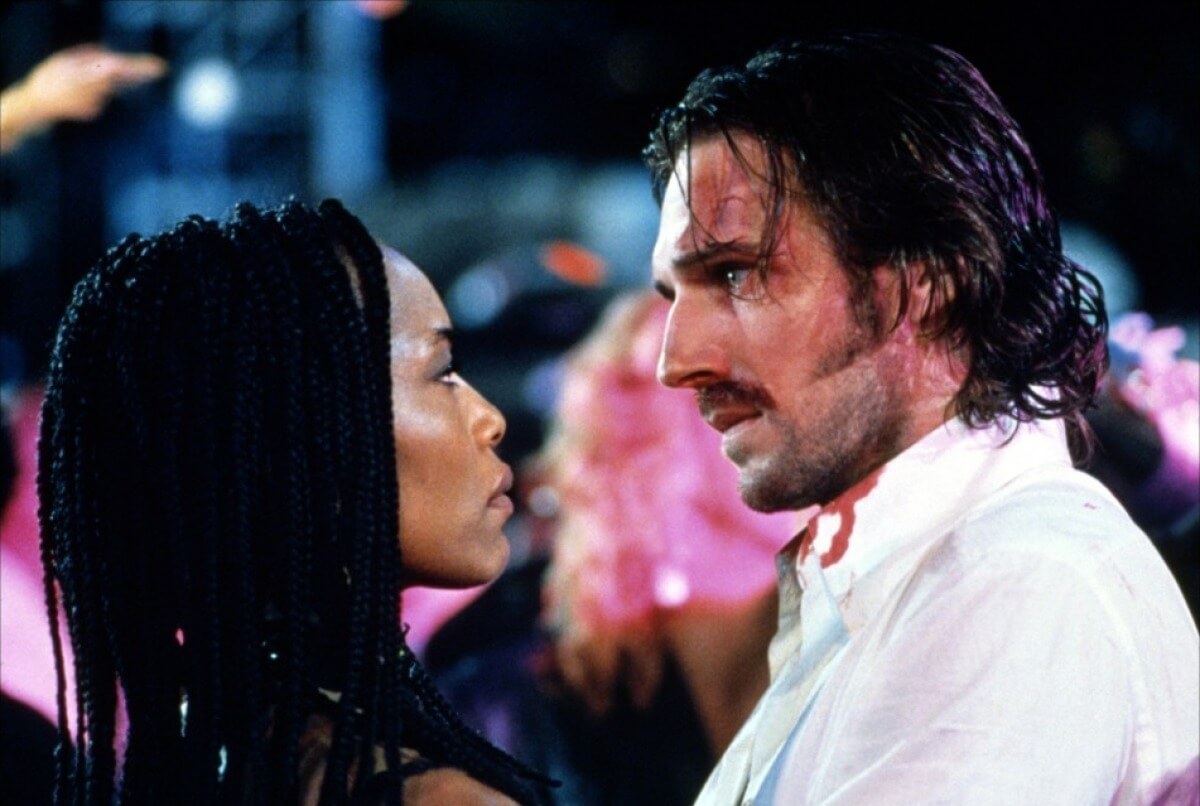
The hero of Strange Days, Lenny Nero (surprisingly easy-going Ralph Fiennes), accepts the reality in which he lives, and even finds himself in it perfectly. This ex-cop sells the forbidden fruit of SQUID recordings – a record of memories and emotions extracted from the cerebral cortex. Thanks to this invention, anyone who wears the so-called ring, is able to find himself at the center of events, whether as a thief during a robbery and on the run from the police, or in the body of a teenage girl taking a shower. He sees, hears, feels the same as the person recording earlier, but he does not risk anything. That doesn’t mean you can’t become addicted. Lenny himself knows this best, unable to forget the feeling he once had with Faith (saucy and defiant Juliette Lewis). He uploads his videos to relive his favorite moments with his ex-girlfriend.
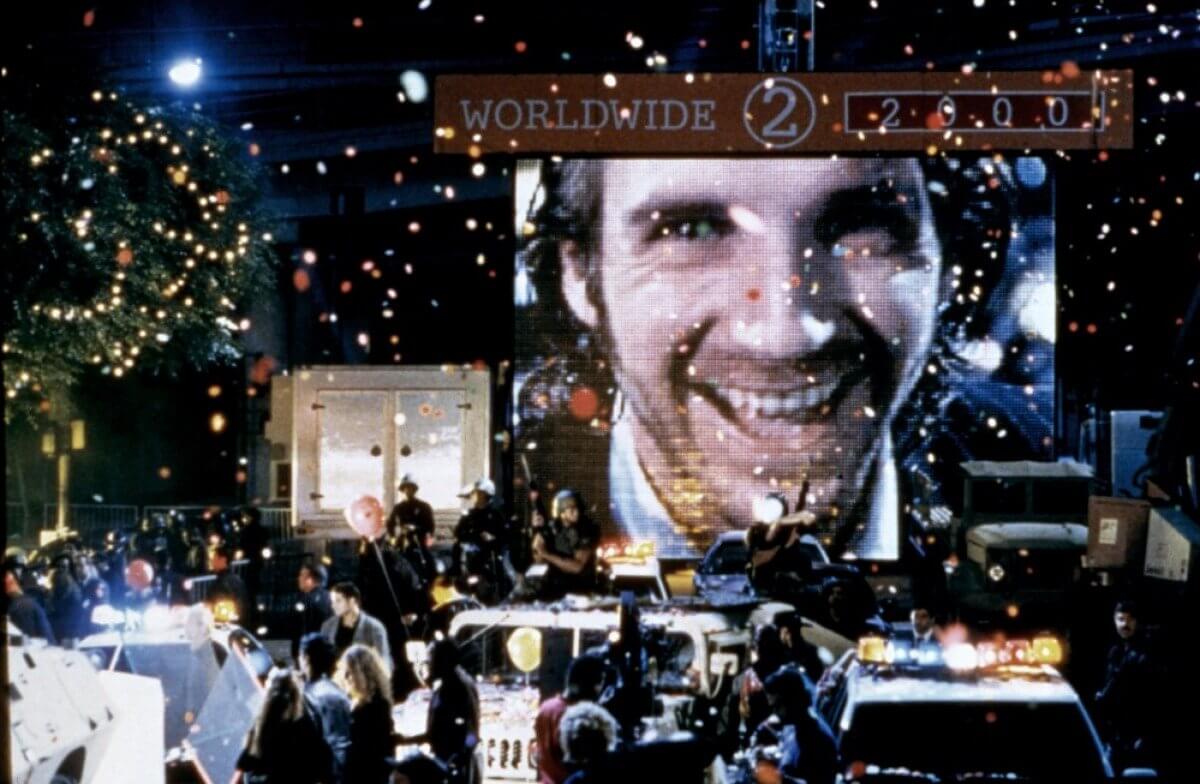
Meanwhile, the world, specifically Los Angeles on the eve of New Year’s Eve 1999, looks like a war zone. The army and police control the order in the streets, but in most districts robberies and assaults are commonplace. Rapper and voice of the people, Jeriko One (Glenn Plummer), calls for an open fight against the oppressor, which is the L.A. police force. So when he is shot dead, allegedly by gang members, many people become disillusioned and others go mad. If the public found out who was really behind his execution, there would be no end to bloody riots. Lenny himself doesn’t care much about the situation, but the ground starts to burn under his feet when he becomes the target of two angry police officers (Vincent D’Onofrio and William Fichtner) and a masked psychopath recording his murders.
Cyberpunk at its best
The film by Kathryn Bigelow, winner of two Oscars for The Hurt Locker, is one of the purest and best cyberpunk films ever made. The action takes place in the very near future (the film was made in 1995), and the futuristic element is the SQUID technology, thanks to which the world presented in it seems close and distant at the same time. Los Angeles is one big dumpster where there seems to be no room for everyone. The public mood is poor, police brutality is taking its toll, jobs are hard to find, and an apocalyptic atmosphere of anticipation for this new, different year 2000 hovers over everything. There are those who predict doom and those who don’t care much about the turn of the century. For Bigelow, this moment serves more than just illustration. It is rather a summary of what the 20th century and the 1990s in particular left behind – the awareness of the end, not necessarily also of a new beginning.
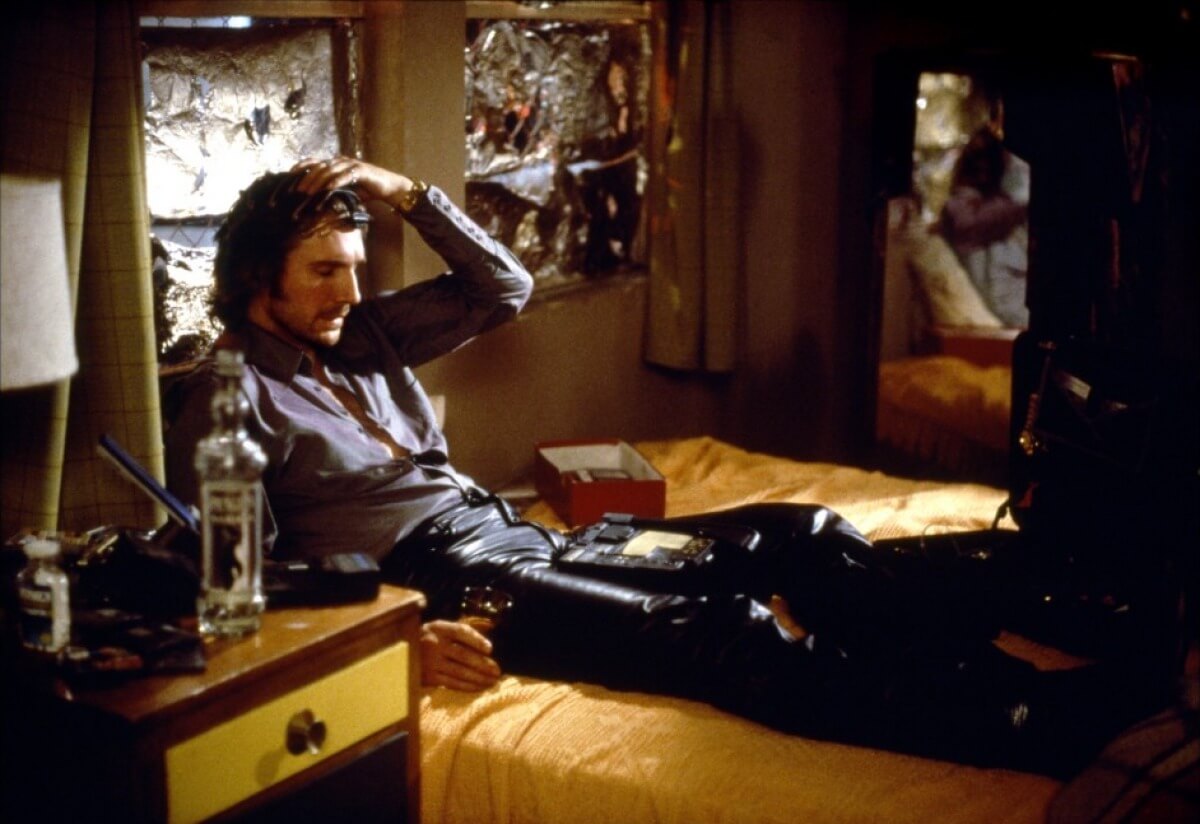
No wonder that the heroes seem completely uninterested in the future. In Lenny’s case, the SQUID allows him to live in the past, still in a relationship with Faith, even though she has been telling him for a long time that it’s all over. The girl prefers to concentrate on her music career under the wings of producer Philo Gant (slimy as usual Michael Wincott), who has become even more addicted to forbidden technology than Nero, which pushed him to the brink of paranoia. Lenny’s pal Max (one-dimensional Tom Sizemore), also an ex-cop, looks like a bum but moonlights as a private detective – tracking people because that’s all he can do. Then there’s Mace (the statuesque Angela Bassett), the main character’s devoted friend and the only person in this crazy world who has too much to lose to want to sink as low as them. Together with Lenny, they make a very mismatched duo – he gets into trouble only for her to get him out of it.
Futurism
The screenplay by James Cameron and Jay Cocks, apart from a crime mystery and reflections on the end of the 20th century, touches on something else, a certain truth about the power of the image. The SQUID is touted as an invention that allows you to experience what the recording person went through (nice scene when Lenny gives his paralyzed friend a recording of a man running along the beach). Voyeuristic tendencies are one thing, but the awareness of remaining unpunished is very much like another invention – cinema. While watching the film, we will not feel what the characters do, but the image and sound themselves fulfill their role. The futurism of “Strange Days” therefore stems from the prediction that the next step towards a fuller perception of a film work, as well as any other audio-visual work, will be the involvement of other senses, not only sight and hearing. We already have 4D and 5D cinemas. What’s next?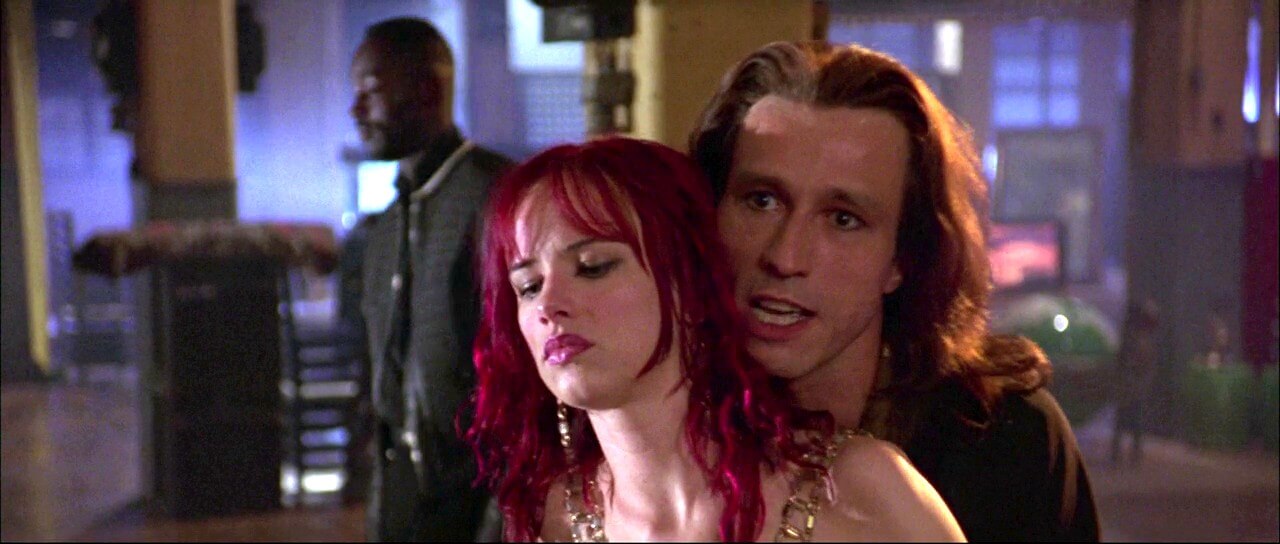
But Bigelow is too conscious a director to trust the future. That’s why you can feel Strange Days without any extra frills – it’s a show of the highest quality, starting from the opening sequence of the robbery of the store, during which we observe the failed heist from the perspective of one of the thieves. We are in the middle of the action, not only during crazy action scenes, but also when through the eyes of a psychopathic killer we ambush the victim, whom we later murder. I write in the first person plural to make it clear that the creator of Point Break is not afraid to show the dangers also resulting from the cinema that she creates. We are participants in history by the very act of looking, even if we do not have the ability to act, like Lenny Nero.
Cinematic kick in the stomach
It is not without reason that Bigelow is considered the author of men’s cinema, effective and very brutal. Strange Days gives an energetic kick thanks to the quick editing – in which Cameron himself had his fingers dipped – and the sensational camera work, but also because the director squeezes the best out of the scenery and characters. He has great crowd control, which is wild when he fights and when he plays. It stages action scenes even better, both first-person and “traditional” ones. Even the music helps her – the score written by Graeme Revell is strong and expressive, but the songs that are the essence of the 90’s (a lot of guitar playing, grunge, rap, ambient) perfectly adhere to the created world.
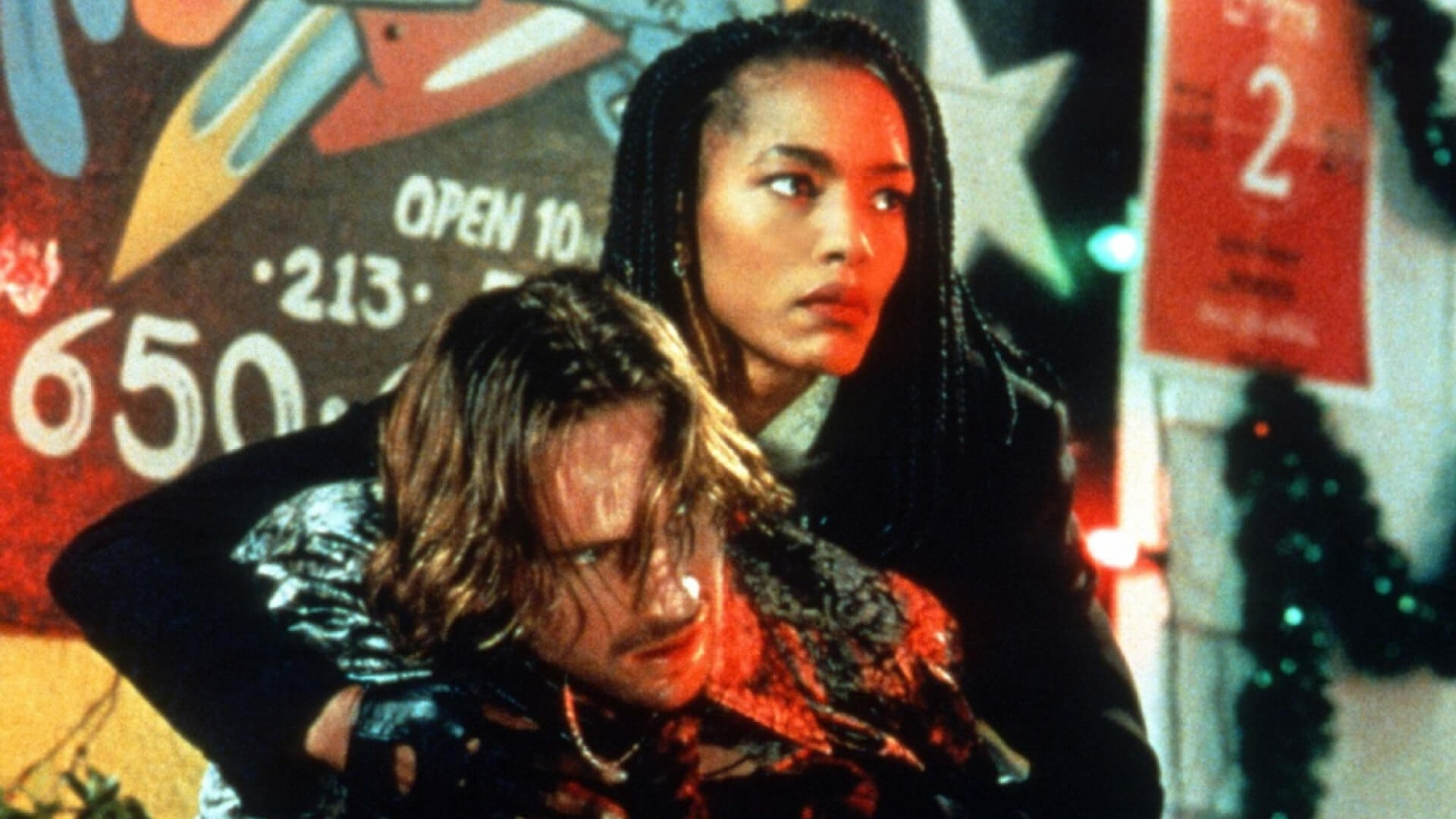
The screen, however, belongs to Fiennes and Bassett. His Lenny gives the impression of a person stronger than he really is, arousing sympathy, but also admiration – there is something in his attitude of a knight who has forgotten what he is fighting for. After Wuthering Heights, Schindler’s List and Quiz Show, it was good to see a different Fiennes, more lively and heroic. Mace, on the other hand, is a fighter whose physical prowess and ability to deal with extreme situations put her higher up the food chain. And looking at Angela Bassett, it’s easy to believe in her strength and determination. Typically Cameronian heroine, in the spirit of Sarah Connor from Terminator 2 and Ripley from Aliens. However, she also carries more pain and regret than she would like to admit. In addition to the criminal intrigue, they both have their own story to tell.
Now considered a cult work (although I still consider it relatively unknown) Strange Days on the day of its release flopped miserably. The film turned out to be a financial disaster, and critics were at a crossroads between the suggestive vision of the near future and the perfection of execution, and the superiority of brutal cinema over an ambitious starting point. But the questions Cameron, Cocks and Bigelow asked still lurk in the film, despite making the whole thing more entertaining. The year 2000 has already passed some time ago, but it seems like we still haven’t progressed much from what was in 1995. We can still look at the world of Bigelow’s work as something that is yet to come.

